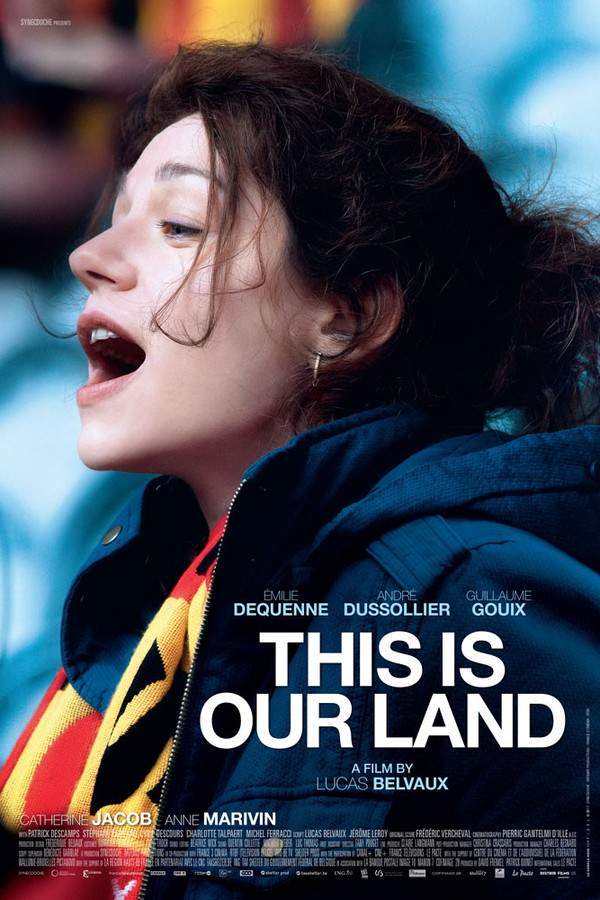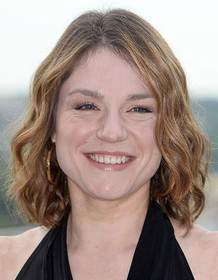This Is Our Land 2018

A compassionate nurse, seeking connection and purpose, becomes entangled with a far-right political movement. Drawn in by their promises, she explores their ideology but soon faces a disturbing reality, challenging her beliefs and forcing her to examine the dangerous allure of extremism and the potential consequences of belonging.
Does This Is Our Land have end credit scenes?
No!
This Is Our Land does not have end credit scenes. You can leave when the credits roll.
Meet the Full Cast and Actors of This Is Our Land
Explore the complete cast of This Is Our Land, including both lead and supporting actors. Learn who plays each character, discover their past roles and achievements, and find out what makes this ensemble cast stand out in the world of film and television.
External Links and Streaming Options
Discover where to watch This Is Our Land online, including streaming platforms, rental options, and official sources. Compare reviews, ratings, and in-depth movie information across sites like TMDb, Wikipedia, Rotten Tomatoes or Metacritic.
Ratings and Reviews for This Is Our Land
See how This Is Our Land is rated across major platforms like IMDb, Metacritic, and TMDb. Compare audience scores and critic reviews to understand where This Is Our Land stands among top-rated movies in its genre.

The Movie Echo Score
Overall, This Is Our Land delivers a thought-provoking political drama anchored by strong thematic relevance but hampered by occasional narrative bluntness. Most appraisals commend its exploration of fear-based division and the lead performances’ depth, while some critics note an uneven integration of subplot elements. The film’s pacing and craft maintain engagement, yet the didactic edge prevents a fully seamless experience. In sum, it stands as a worthwhile but imperfect reflection on societal tensions.
The Movie Echo Score Breakdown for This Is Our Land

Art & Craft
In terms of art and craft, the film’s direction is purposeful and the editing maintains narrative momentum, though visual flourishes are restrained. Observers note the measured pacing underscores political tension, and the production design convincingly evokes a provincial town. Despite crisp technical execution, moments of blunt dramatization slightly diminish stylistic subtlety. Net impression: competent craft supports but does not elevate the material.

Character & Emotion
When it comes to character and emotion, performances are widely praised for depth and nuance. The lead portrayal of Pauline is compelling in her moral shifts, and supporting roles convey credible interpersonal dynamics. Some critique notes underdeveloped emotional textures in secondary relationships, yet the cast’s commitment ensures a palpable resonance. Overall, character work provides the film’s strongest emotional anchor.

Story & Flow
In terms of story and flow, the narrative presents a timely exploration of political extremism but occasionally veers into didacticism. Pacing generally sustains engagement, though the juxtaposition of political intrigue and a romantic subplot can feel disjointed. Critics observe that thematic bluntness undercuts opportunities for subtle development, resulting in uneven coherence. Overall, the plot offers compelling ideas but lacks consistent narrative finesse.

Sensory Experience
When evaluating sensory experience, the film employs a restrained visual style and utilitarian soundscape that reinforce its sober tone. The soundtrack supports dramatic moments without overshadowing dialogue, and ambient sound design situates the viewer in the setting. Some find the aesthetic approach conservatively executed rather than strikingly immersive. Overall, sensory elements are competent but rarely extend beyond functional support of the drama.

Rewatch Factor
Regarding rewatch factor, the film’s political relevance and strong performances merit a second viewing for thematic reflection. Viewers may appreciate deeper character motivations and shifts on repeat, and the film’s socio-political undertones retain topical interest. However, narrative bluntness and limited sensory surprises may reduce appeal for casual rewatchers. Net impression: moderate replay value driven by ideas more than stylistic variety.

61
Metascore
tbd
User Score


73%
TOMATOMETER

56%
User Score

58
%
User Score

1.00/5
From 1 fan rating
Take the Ultimate This Is Our Land Movie Quiz
Challenge your knowledge of This Is Our Land with this fun and interactive movie quiz. Test yourself on key plot points, iconic characters, hidden details, and memorable moments to see how well you really know the film.
This Is Our Land Quiz: Test your knowledge about the film 'This Is Our Land' and its complex themes of politics, family, and personal struggle.
What is Pauline's profession in the movie?
home nurse
teacher
doctor
politician
Show hint
Full Plot Summary and Ending Explained for This Is Our Land
Read the complete plot summary of This Is Our Land, including all major events, twists, and the full ending explained in detail. Explore key characters, themes, hidden meanings, and everything you need to understand the story from beginning to end.
Pauline, a devoted home nurse, lives in a quaint village in northern France’s Pas-de-Calais region with her children, Tom and Lili, as well as her father, Jacques Duhez, a retired worker and former member of the French Communist Party. Relying solely on her salary to support her working-class family adds an air of urgency to her daily struggles. Known for her compassionate nature, Pauline has gained a reputation as a kind and empathetic caregiver who is beloved by her patients.
One day, Dr. Philippe Berthier, a right-wing physician associated with the French Communist Party, approaches Pauline with an intriguing proposition from Agnès Dorgelle, the leader of a nationalist party. She has endorsed Pauline as a candidate for mayor, stating that her exceptional qualities as a nurse and her ability to connect with the community make her the ideal choice.
As Pauline’s journey progresses, she encounters Stéphane Stankowiak, an old school acquaintance who also coaches her son’s soccer team. Unbeknownst to her, Stéphane is entangled with a group of skinheads but is trying to separate himself from them to protect Pauline’s campaign. Dr. Berthier, however, threatens to reveal Stéphane’s past connections to Dorgelle’s party if he continues his relationship with Pauline, adding yet another layer of tension.
When Pauline informs her father, Jacques, about her decision to run, he is horrified and adamantly declares he cannot support a child who may align with fascist ideals. This decision splits the community starkly: conservative patients rally around her while progressive supporters withdraw. Among her friends, division simmers as the racist Nathalie Leclerc joins her campaign to sabotage it with misinformation, while Nada Belisha, a French woman of Slavic descent, accuses her of being a mere puppet for extremists.
With rising concerns for her safety, Stéphane takes proactive steps by discreetly engaging reliable friends to keep watch over her. However, chaos erupts when skinheads violently attack a protestor, leaving her gravely injured. In a desperate bid to help, Pauline faces hostility from nearby residents more concerned with their own affairs than the violence occurring before them.
Feeling increasingly isolated from her father, friends, and patients, Pauline seeks advice from Berthier, as the physical distance from Stéphane grows. During this turmoil, she uncovers Stéphane’s troubling history with violence, forcing her to confront that he may be intertwined with the worsening conflicts surrounding her. As her political dreams crumble and her personal relationships fray, Pauline makes the heart-wrenching decision to leave the party behind in favor of her feelings for Stéphane.
In her quest for comfort, Pauline reintegrates with Jacques and shares joyful moments with her loved ones, including an outing to the stadium with her children and Stéphane. The atmosphere is vibrant and filled with laughter, a temporary escape from their woes. However, the joy turns bittersweet when Stéphane unknowingly allows Lili to view photos he took with his friends—images that reveal an alarming narrative of aggression towards refugees.
Infuriated by this shocking discovery, Pauline confronts Stéphane with her fury, brutally unleashing her anger until Jacques and the children intervene. They navigate her back home, where the stark realities of Stéphane’s past and present loom ominously, threatening to dismantle everything she believed about their bond.
Uncover the Details: Timeline, Characters, Themes, and Beyond!

Coming soon on iOS and Android
The Plot Explained Mobile App
From blockbusters to hidden gems — dive into movie stories anytime, anywhere. Save your favorites, discover plots faster, and never miss a twist again.
Sign up to be the first to know when we launch. Your email stays private — always.
Watch Trailers, Clips & Behind-the-Scenes for This Is Our Land
Watch official trailers, exclusive clips, cast interviews, and behind-the-scenes footage from This Is Our Land. Dive deeper into the making of the film, its standout moments, and key production insights.

Unlock the World of Movies with Our Comprehensive Wiki
Dive into our Movie Wiki for in-depth film encyclopedia entries, including cast biographies, production trivia, plot synopses, behind-the-scenes facts, and thematic analyses. Whether you’re researching iconic directors, exploring genre histories, or discovering hidden easter eggs, our expertly curated movie database has everything you need to fuel your cinematic passion.

Quick Links: Summary, Cast, Ratings, More

What's After the Movie?
Not sure whether to stay after the credits? Find out!
Explore Our Movie Platform
New Movie Releases (2025)
Famous Movie Actors
Top Film Production Studios
Movie Plot Summaries & Endings
Major Movie Awards & Winners
Best Concert Films & Music Documentaries
Movie Collections and Curated Lists
© 2025 What's After the Movie. All rights reserved.

















